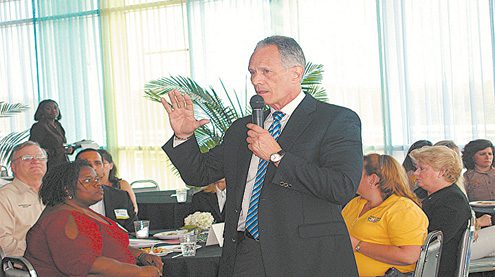
Miami-Dade County Mayor Carlos Alvarez, who is facing a recall election on Mar. 15, addressed members of the Cutler Bay Business Association (CBBA) at the group’s Feb. 10 meeting. Alvarez stated his case regarding the recall move organized by Norman Braman and the property tax issues that led up to it.
Convened in the Palm Room of the Palmetto Bay Village Center, the regular monthly meeting drew a crowd of local business people and public officials from Cutler Bay and Palmetto Bay. On the defensive, Alvarez spoke with passion about the pending recall vote.
“I’m going to tell you the reason why I made the decisions,” Alvarez said. “There’s a percentage of you in the crowd that will not support the decision I made and some of you will, and hopefully I can sway some of you to my point of view.”
Alvarez critized the few commissioners who voted “no” on the budget as “mayor-wannabes” who offered no options or alternatives themselves.
“I had no hidden agenda,” Alvarez said. “I have served this community for 35 years. I’ve lived here since 1960. Either way, I’m turned out in 19 months, but I’m not going anywhere. My entire family lives here, so my only agenda is to make the right decisions.
“I make mistakes, just like you. But that’s my agenda — to improve the quality of life of the people that live in Miami- Dade County. That’s where I’m going to be living,” he said.
“This is what I was faced with — budget year 2009-10 the commission passed a flat millage rate budget, which meant that we had to make up a $420 million budget shortfall with a flat rate. Which meant we had to cut a lot. Which meant that we had to basically get concessions from our unions that over a period of three years saved you, the taxpayers, $224 million. That’s a fact. Now you read the newspaper and you’ll read that the reason why there’s a rollback budget is to give folks salary increases, and that’s just absolutely not true.”
Alvarez explained that in two years they had to make up an $860 million budget shortfall, and over a period of four budget cycles had to make up $1.2 billion in budget shortfall.
“Now what would a flat budget for the current year mean?” Alvarez said. “I’m not going to talk about water and sewer because they have fees. Solid waste has fees. DERM has fees. The airport has fees. The seaport has fees. So property taxes really don’t affect a number of our departments.
“But they do affect fire, they do affect police, parks, transit, and social services. The Fire Department is in an $80 million hole. Now, no one here calls the Fire Department at three in the morning to have a cup of coffee. People call the fire department in the middle of the night because they have chest pains, or somebody fell out of bed and can’t get back in bed. Or they respond to traffic accidents when somebody’s trapped in a car.”
Alvarez said he was certain that the residents of Miami-Dade County would not tolerate 440 firefighters being laid off and the closing of 10 fire stations. He said that police, bus service, parks, feeding the poor and other vital services would be adversely affected by big budget cuts.
“I made the decision that I did because I believed it was in the best interest of the county as a whole,” Alvarez said. “Not certain segments, but as a whole. I did not want to recommend a budget that would compromise basic services, and if and when we have an election, and the majority of people feel that I should have done that, then they can vote me out. But I can live with the decision I made. I couldn’t live with the other option, as a person.”
Alvarez cited problems with the petition drive, from the way the petitions were gathered, the fact that the clerk of the court was out of the country when they were approved, and that thousands of petition forms appeared to have been signed by voters after they were notarized, not before.
“You know, special elections only get 10 percent turnout,” Alvarez said. “It’s very dangerous to take a subject and have somebody who has a lot of money literally pour a couple of million dollars into something to get their way.”
In response to a question by Bill Meiklejohn about if he could continue to support improvements to the seaport and deepening the channel for heavier laden cargo ships to be able to dock here, Alvarez said he would.
“The dredge is extremely important,” he said. “We’re the first port ships coming through the improved Panama Canal in 2014 will arrive at. That’s potentially 34,000 jobs.”






